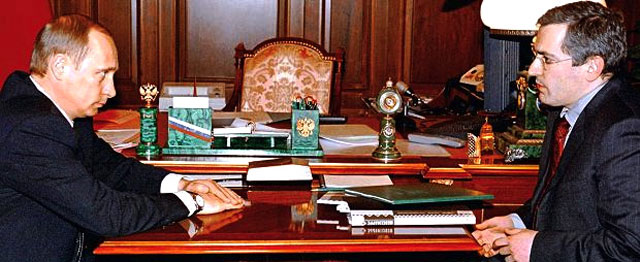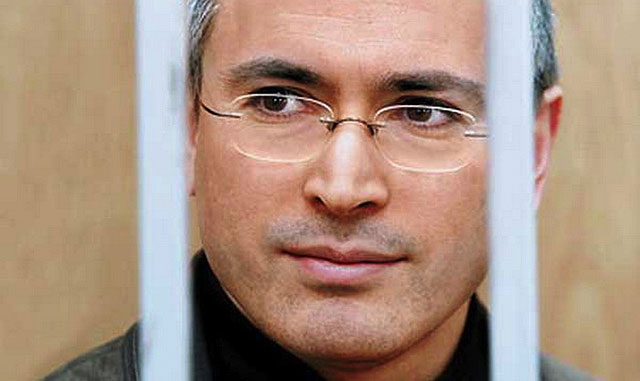June 26 marks the 50th birthday of Mikhail Khodorkovsky—and his 10th birthday behind bars. IMR Senior Policy Advisor Vladimir Kara-Murza discusses the personalities and the times of Mikhail Khodorkovsky and Vladimir Putin, modern Russia’s two antipodes.

There are people—mostly political and public opinion leaders, often figures of the cultural world—who are known and recognized simply by their initials. FDR and JFK in America, BHL and VGE in France are just the best-known examples. Russia has two such people: VVP and MBK—two men who have nothing in common, but who have forever been linked by the same political era. In future history textbooks, their names will be written on the same pages.
Even though Vladimir Putin became known to the Russian public much later than Mikhail Khodorkovsky, MBK has become, for modern Russia, a kind of “anti-Putin”—even though he never aspired to such a contraposition and, indeed, never held political ambitions of his own. In everything Khodorkovsky and Putin have done and continue to do, these two men are the direct opposite of each other.
MBK’s chief attribute has been openness. Everything VVP does works in the opposite direction.
MBK’s chief attribute has been openness, whether it be the groundbreaking adoption by his company, Yukos, of Western auditing and accounting standards; his quest to integrate Russian business and society into the civilized world; or his readiness to publicly challenge government nepotism and corruption, as he did during his fateful spat with Putin in the Kremlin on February 19, 2003 (http://www.youtube.com/watch?v=cYGA5sIhWhc).
Everything VVP does, both in the economy and in politics, works in the opposite direction: his corruption, his lack of openness, his lack of accountability. It is under Putin—not in the 1990s that are so demonized by his propaganda—that Russia has fallen to the 133rd place (of 174) in the Corruption Perceptions Index (http://www.transparency.org/cpi2012/in_detail), below Honduras and Uganda. It is under Putin that Russia’s largest companies have been turned into personal piggybanks for those close to the Kremlin and the president—the real oligarchs, unlike the businessmen of the 1990s, who never held real political power.

MBK’s public and charitable projects—the Open Russia Foundation, the Federation of Internet Education, the Club of Regional Journalism, and the School of Public Politics—have been aimed at educating society, raising its level of development, and raising civic awareness and self-sufficiency so that informed and independent citizens can make informed and independent decisions. Everything VVP does—establishing strict controls over the media, suppressing civic activism, and increasing citizens’ dependence on the government—is aimed in the opposite direction. Khodorkovsky’s “New Civilization” project was about teaching Russia’s youth how to live in the modern world—not how to trample on the portraits of “enemies,” as the pro-Kremlin Nashi movement would later do.
MBK has donated money to political parties on both the left and the right in order to foster political pluralism and make Parliament a real place of discussion. VVP has consistently purged Russian politics of anyone who is capable of even the smallest degree of independence. MBK has shown, by his own example, that Russian business can be socially and civically responsible. Under VVP, personal enrichment—often at the expense of taxpayer resources—has become the raison d'être for businesses close to the government.
MBK has become a symbol of the injustice and cruelty of Putin’s system.
MBK has insisted on the need to increase society’s intellectual potential. One of the main goals of his Open Russia Foundation was to create the conditions in which educated professionals would “work and make money in Russia, helping the country to reach the level of the world’s leading economies.” VVP requires loyalty and political passivity. His regime actually benefits when Russian society’s intellectual avant-garde—the active, the educated, and those with a conscience—is emigrating from the country.
By the age of 40, Mikhail Khodorkovsky has achieved what most people do not achieve in their lifetimes. He celebrates his 50th birthday as a prisoner of conscience. For Russia and for the whole world, MBK has become a symbol of the injustice and cruelty of Putin’s system. His fate is perhaps the best illustration of the character of a president who, for reasons of personal animosity, is willing to deprive the country of a man who could have done so much for its development and modernization.
“Could have done,” however, does not seem like an appropriate turn of phrase. The decade between 50 and 60 is considered to be the most productive period for a man. Khodorkovsky is only 50, and there is little doubt that he has many new chapters of his biography yet to write.

